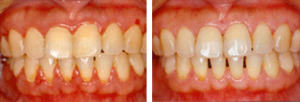What is scaling -dental cleaning?
Scaling -dental cleaning is one on the most significant procedure that helps to keep gums and teeth healthy and firm. Calculus/tartar gets deposited over a period of time between the teeth and the gums which causes tooth fall and unhealthy gums . This procedure basically removes infected deposits like plaque, calculus, stains and other harmful elements from tooth surface which are difficult to remove while brushing with ultrasonic scalers.
Why is ‘scaling’ or ‘professional cleaning’ necessary?
The procedure is necessary to remove the plaque and tartar (grey, yellow, brown hard deposits on the teeth near the gums) which are one of the major reasons that cause gum disease.
A few minutes after brushing, a very thin layer made up of saliva, proteins, and bacteria (also called the pellicle) is formed on the tooth surface which acts as a base for bacterial attachment and growth. Within a few hours the accumulation of various species of bacteria along with sugar from the food we eat results in formation of a pale yellow or white sticky substance known as dental plaque. This if left on the teeth can attract minerals from the saliva and harden causing tartar. Both these are detrimental for the health of the gums and can cause gum disease, which on progressing, can manifest as periodontal disease.
Professional cleaning or scaling helps remove these and reverses gum disease or prevents the progression to periodontal disease.
How often should you get it done?
We in our clinic recommend to do scaling twice a year. If you maintain your oral hygiene exceptionally well, its recommended that you get it done once a year.
How is it done?
In the early days, dentists used manual instruments for the procedure. This was time consuming and labour intensive. With the advent of technology, ultrasonic scalers are now being increasingly used. The ultrasonic scaler consists of a hand-piece with a variety of tips which are used depending on the type of tartar being removed. The tips vibrate at a very fast rate and are cooled down by a water spray.

Will it be painful? Will there be bleeding?
If there are only superficial tartar deposits, it may not be painful. If there are deep deposits, we will usually use local anesthesia before the procedure.
There may be slight bleeding as the plaque and tartar usually cause gum inflammation and touching highly inflamed gums can cause bleeding.
I’ve heard that teeth become loose after the procedure. Is it true?
This is a common myth. The tooth may appear to be ‘loose’ after the procedure especially if you are suffering from periodontal disease. However, this isn’t because of the procedure. Even though there is loss of supporting structures like the gums and bone, the tartar surrounding the teeth may hold the teeth together and give a false sense of stability.
When this tartar is removed, the teeth lose their ‘faux anchors’ and may appear loose.

Will the gap between the gums and the teeth or between teeth increase?
Some feel that scaling results in gap between teeth which is wrong, the gap is simply seen because the tartar between the teeth gets cleaned up in scaling
Will it be enough to reverse my gum disease?
In case of initial stages of gum disease, scaling may be all you need. However, if the gum disease has progressed to further stages like periodontitis, further treatment may be required.
